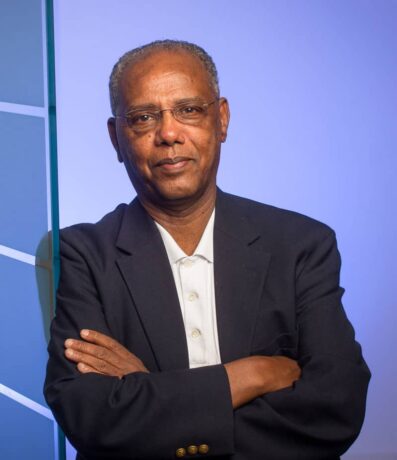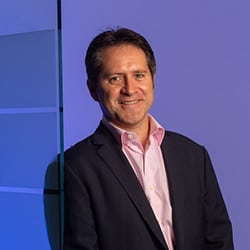
The Jan. 6 riot at the U.S. Capitol was a violent breach of the country’s democratic traditions and institutions. It was a traumatic break from our ideals of peacefully redressing our disputes and grievances, whether they are real or fueled by misinformation and imagination, that we have promoted around the world as development professionals.
Creative quickly condemned the rioters’ rejection of basic democratic values and the horrific violence many of them committed, while congratulating Members of Congress and their staff for resuming their constitutional duties that evening.
Creative asked a dozen staff members in its Washington, D.C., office to briefly reflect on the insurrection, where we are today and the road ahead of us. Our staff commentators are as diverse as the United States itself – immigrants, veterans, educators and more – and all were profoundly affected by the deadly riot.
— By Leland Kruvant, President and CEO
Acknowledge our sins and build a common vision

Semere Solomon, Senior Director, Africa Regional Center
Capitol Hill symbolizes the values of American democracy and the Jan. 6 riot was an assault on these very virtues. It started long ago with the politics of hate that are rooted in bigotry and lies. It was only a matter of time before it turned into political violence. Having lived through and witnessed war, I know the use of violence and lies cannot resolve political differences.
In my work as a development veteran and an educator in conflict and post-conflict environments, my colleagues and I have found that it is critical to confront acts of political violence – not deny or diminish their importance – address the basis of false claims, seek to build a shared vision of future together and understand that we can have different options without political violence.
Jan. 6 should be a wake-up call to the whole nation. Americans should never take for granted the rights they enjoy. Young Americans should be taught how to safeguard their hard-won democracy.
Ensure U.S. elections continue to be a global role model
Jeffrey Fischer, Senior Electoral Advisor
The United States has been a global leader in the promotion of democracy. For more than 30 years, I have been part of that promotion – from Timor Leste to Bosnia. Our system of voting, representation and justice have been put forward as examples for others to emulate. Even the “hanging chad” crisis in the 2000 presidential election did not diminish the reputation of U.S. elections since it showed the process can accommodate and resolve electoral disputes in a peaceful, fair and acceptable manner.
Just as 9/11 has become an emblematic date as a transformative attack on U.S. security, 1/6 can be regarded in similar terms as a transformative attack on U.S. democracy. However, the attack on the Capitol presents an entirely new crisis to the United States, both internally and in its promotion of democracy abroad as a result of its scale, intensity, racial implications, ideologies and encouragement by leaders.
There needs to be an assessment of the impact of the insurrection on perceptions of U.S. democracy and its promotion among allies, developing democracies and authoritarian regimes so that the strategies can be crafted to overcome these new concerns and doubts.
Create new narratives in a sea of disinformation
Tamara Grigoryeva, Media Lead, Creative Development Lab
Disinformation is plaguing democracies worldwide, and we just saw how online disinformation can lead to offline violence. To prevent the spread of disinformation in the United States, we need to deviate from the narratives of shock, labeling and polarization. These are the seeds of disinformation.
Owning up to our country’s past atrocities, actively pursuing anti-racist measures and creating a healthy dialogue without labels among all stakeholders are steps that everyone can pursue online and offline. At the Creative Development Lab and with its partners, we are working to develop the pre-requisites for a healthy information space: building anti-disinformation methodologies; enabling a diverse yet united media and civil society; and supporting political will for fair legislation and digital literacy for all.
Preserve free speech, condemn violence
Olivia Chapman, Digital Media Specialist
Social media has proven itself to be a unique force of political and social mobilization. From Black Lives Matter in the United States to the recent #EndSARS campaign in Nigeria, networking and content-based platforms have brought awareness to injustices, created debate and attracted new members to their causes. In turn, much of this online activism has transitioned to in-person protests and other displays of solidarity.
However, mobilization via social media also presents clear risks. Powerful social media companies continue to grapple with governments and the civil sector in combatting the spread of disinformation and holding accountable those that abuse their influence, all while ensuring their platforms are preserved as channels for free and fair speech.
With our democratic values (and public safety) on the line, we all have a role, even as individual social users, in pushing for the prioritization and acceleration of safe social media policies and legislation.
Pursue public interest over personal goals
Tom Wheelock, Senior Vice President & Senior Director, Communities in Transition Division
During and after the Jan. 6 attack on the Capitol, my consumption of media and analysis of the day’s events skyrocketed. Former California Gov. Arnold Schwarzenegger’s powerful message was the one that truly summed up the situation the United States is facing. He reflected on growing up in post-World War II Europe, seeing the dangerous consequences of political leaders who used lies and misinformation to pursue power.
Schwarzenegger’s message is simple: Our leaders need to pursue the higher public interest and not their own personal or political goals. Whether from the left or the right, there is plenty of common ground to be found in what he says.
Repairing the rip in our social fabric

Rich Jaskot, Director, Stabilization and Development Practice Area
The attack on the Capitol made me angry and sad. The riot was something that most people, including myself, would have expected in a country with fragile electoral and governance systems. I was naïve enough to believe it wouldn’t happen in the United States. After nearly 30 years in the U.S. military and my current role in stabilization assistance, I have seen the impact of internal divisions on a country’s social fabric, its identity as a nation and its institutions.
But where do we go from here? The unrest and division in the United States remain. Hopefully, this was enough of a shock that people can reach left and right, and if not move toward the middle, at least try to listen and understand, to begin to repair the fabric of who we are, as a people, in support of the new Biden administration. It must be the people who come closer together, because we are the government and we are the nation. We are all needed in rebuilding and repairing a nation worth saving.
Don’t let the mob win out

Enrique Roig, Director, Citizen Security Practice Area
President-elect Biden and many of the senators from both parties gave important speeches during and immediately after the Capitol insurrection that tied together an important narrative about who we are as a country. They called out what happened in the strongest language and provided a roadmap for Americans to reclaim their country. This means accountability for those who enabled this behavior, compassion for those who were disgusted with what took place and support for policies that unite the country.
This won’t be an easy task given the media echo chambers we live in and the radicalization of many individuals through disinformation. We must start somewhere and that begins with those closest to us, whether a family member, friend or someone on social media. It’s going to be a bumpy ride, and this will not end anytime soon. More individuals will come forward peddling hate and division.
Those of us across party lines who stand for unity, compassion, hope, rule of law and democracy need to hold fast to our shared, positive vision for the country. The time is now friends. Don’t let the mob win out.
For more, read Enrique’s blog on IQLatino.
Address the emotional health of children
Janet Shriberg, Senior Advisor for Child Protection and Wellbeing
Our social and emotional health is at stake. The anger, fear and hurt – combined with ongoing losses from the pandemic – are exhausting and traumatic for all of us. The Jan. 6 assault on the Capitol building played out for all of us, including our children. It is during these times that the care and protection of our children are critical.
Evidence suggests that adults may effectively support children by helping them to process how they feel, to refrain from judgment, to listen and to help them to manage their emotions so they do not become overwhelmed. Taking action in our communities can also move us forward. For example, supporting school efforts, including teachers’ wellbeing and their professional development, to create classrooms and learning opportunities early that help students challenge biases, problem solve, resolve conflicts peacefully, demonstrate inclusion, tolerance and accountability holds promise for future generations.
I lived through this in the former Czechoslovakia
Sarka Sengezener, Director, Youth, Economic Growth and Agriculture Practice Area
I grew up in Czechoslovakia and recall the fall of the Soviet Union. Western-style democracy, real electoral participation and other liberties were much desired but new at that time. Political pluralism was also a new system and it took us the entire 1990s to learn how to navigate it. We had many dark days when our fledgling democracy was challenged by extreme right and left political forces.
Nowadays, the Czech Republic (now Czechia) is a well-functioning democracy and a E.U. member. We cannot underestimate this type of threat to democracy in the United States. For me, the lessons learned from the Jan. 6 attack on the Capitol are to stay vigilant, safeguard democracy and pay attention to what has happened to different democracies in the past.
Remember that “democratic values” are more than words
Rohullah Osmani, Senior Advisor, Economic Growth Division
The horrifying Jan. 6 event in the United States demonstrates that we face huge challenges that threaten our democratic values. We use the words “democratic values” without always thinking of their meaning. Coming from Afghanistan, I know the value of civil society, effective governance, legitimate elections and liberties.
Today, we are using words like “resilience” – a word often used when discussing lesser developed countries – to talk about the United States. In any country in the world, ensuring resilience means building effective institutions and legitimacy through sound political processes that facilitate state-society relations and expectations.
The rapidly changing dynamics in today’s world, including in the United States, demand new approaches to deal with our challenges by building resilience. It requires an investment in youth, women and those marginalized non-majority groups to tackle the inequalities based on race, poverty, age, gender, ethnicity and geographic location among other social differences.
The lessons I have learned in my home country and around the world demonstrate that this is not the time to give up. Instead, it is a time to double down on our valuable institutions, ensure their transparency, reinforce their legitimacy and better connect them with the people they serve.
Create new relationships built on trust
Debby Kimble, Director, Democracy, Governance and Electoral Integrity Practice Area
Watching the shocking events unfold on Jan. 6, I found myself contemplating my 40-plus years of work on issues related to justice, fairness and integrity at the community level in the United States and around the world.
Critical to the work is understanding how political, social and economic change affects people directly. During my tenure as a city manager in a once economically thriving U.S. Midwestern city, I went to neighborhoods and listened to the residents who were experiencing crime, loss of employment and declining property values. It was the first step in establishing new relationships built on trust. Equipped with this knowledge, the city council, staff members and I worked to align our services with the citizens’ needs. Opening this line of communication set a new governance paradigm and reflected a vision for a relationship with the population defined by “shared responsibility and shared success.” It is a successful formula that we use today at Creative.
I realized that these years of experience left me with one compelling thought: We can move forward. Mind you, it will not be easy, but to quote a former employee of mine – “the impossible just takes a little longer.” Collectively, we will heal our democracy – one community at a time.